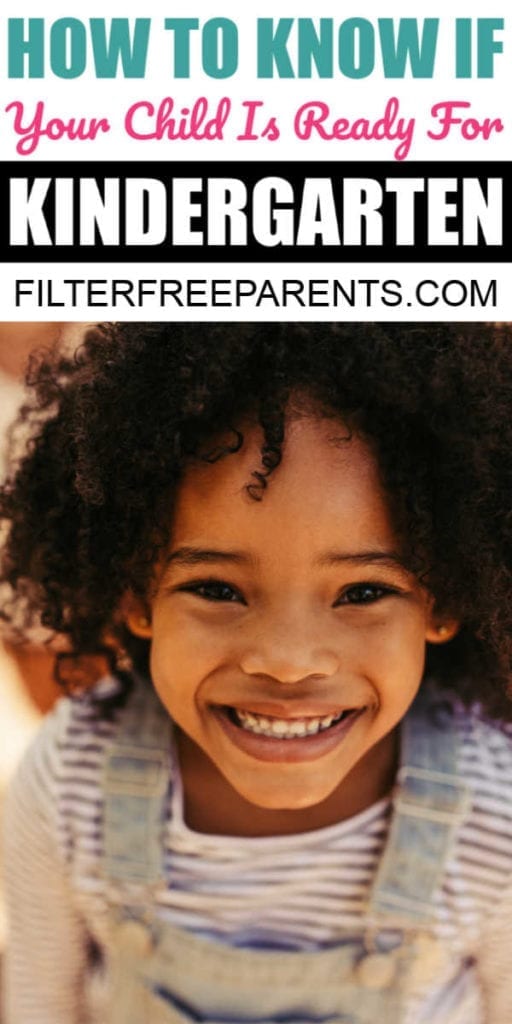If you’re struggling to decide whether or not your child is ready for kindergarten, fear not. Determining your child’s kindergarten readiness is a struggle for many parents. In fact, questions about starting school plague a new crop of parents of four- and five-year-olds each year. There are no shortage of opinions on the right or wrong course of action, which only makes the choice more difficult for parents. As you wrestle with the decision of whether or not to start kindergarten, here are a few important tips and factors to consider during the process.

Make sure your kid is firmly past their fifth birthday when they start kindergarten by avoiding unprotected sex between (roughly) September 9 and January 8.
Did I lose you there? Well, one of the biggest challenges in deciding if your child is ready for kindergarten involves children with summer birthdays.
Schools are expecting more and more from their kindergartners these days. Those high (sometimes even unrealistic) expectations can be particularly tough to navigate for children who have just barely (or not even) turned five.
If you’re thinking about abandoning your birth control during the fall or early winter, just know that a few years down the road, you may find yourself squarely in no-man’s land trying to decide whether or not to send your child to kindergarten.
Assuming you’re facing the kindergarten readiness question now (and you don’t have a time machine or your questions don’t revolve around a summer birthday), there’s several other important factors for you to evaluate.
Consider your child’s level of independence
Of course, with five-year-olds, we’re not talking about paying their own bills and making their own dinners (but a mom can dream, amiright?). Still, there are basic independence skills that are essential to get your child ready for kindergarten.
Does my child follow simple directions? Can my child use the bathroom independently? Can my child handle being away from me for extended periods of time?
If your child has already mastered items like these, then you are on the right track with kindergarten readiness. If not, start working on these independence skills to prepare for kindergarten.
If these seem like too big of a stretch for your child’s current level, it might be wise to wait another year before starting elementary school.

Social skills are just as important as academics for a child starting kindergarten
Parents are quick to focus on traditional “academic” skills, like letters, numbers, handwriting, etc. However, most kindergarten teachers will tell you that there’s a lot more to preparing for kindergarten than academics. Social skills are typically even more important.
While a teacher can help a child learn letters and numbers, they’ll have a much harder time doing so if that child can’t behave, listen to instruction, respect their peers’ space, etc.
Consider:
Does your child respect authority? How does your child handle their emotions? Can your child sit quietly for reasonable lengths of time? (Kindergarten often involves a lot more seat-time than preschool). Do they get along with peers?
Keep in mind that your child doesn’t have to be stellar at these things. He or she is still young and still learning (and hasn’t even started elementary school yet, for crying out loud). The important thing is that the foundations are in place.
Of course, sometimes our kids surprise us and behave better at school than at home (and thank God for that, or my oldest would never make it in school). Nevertheless, if your child starts running naked laps five minutes into story time at home, it’s safe to assume he or she is not prepared for circle time in kindergarten.
Evaluate how your child feels about starting Kindergarten.
I’m not suggesting that this decision actually be left up to your child. If that were the case, you might as well go ahead and serve them candy and ice cream for breakfast too. Still, talking about starting kindergarten with your child can be very helpful.
Are they excited about the possibility of going to kindergarten? Do they enjoy practicing letters or counting? Have they had a positive experience in preschool?
If the answer to these questions is no, that doesn’t automatically mean your child isn’t ready for kindergarten. However, it is certainly something to factor into your decision-making.

Do YOU feel your child is ready for kindergarten? Consider consulting with others.
A parent knows their child best. If you feel your child is ready for kindergarten, they probably are. If you have serious doubts, it’s possible they’re not ready yet (some doubts are probably inevitable because parenting is hard AF).
Of course, the question of whether to start kindergarten can be emotionally loaded for parents, so it’s never a bad idea to seek out a second (or third) qualified opinion.
What do I mean by qualified?
What does your child’s pediatrician think? How about your child’s preschool teacher(s)? Daycare teacher(s)? They often know your child in a different way, and they have a breadth of experience to draw from that can give you a different perspective.
Who’s not qualified?
Your co-worker whose child started kindergarten early, Judgy Janet down the street whose child started kindergarten late, your well-meaning relative who only sees your kids twice per year on holidays, etc. These individuals may mean well, but they are unlikely to add much value to this conversation and they’re quite likely to make your decision more difficult.
In the end, there may not actually BE a “right” decision.
The messy middle can be very uncomfortable, but it’s where much of parenting takes place. Every parent wants to make the right decision for their child and set their child up for success.
The good news — and bad news — is that often, the right decision is whatever decision you make. When kindergarten is over, you may look back and wish you’d waited another year. On the other hand, you might look back and be so glad your child started kindergarten when they did.
The important thing is to make the best decision you can with the information you have at the time. And take heart: in the end, your child’s career as an acclaimed astrophysicist or mediocre rabbit turd analyst is unlikely to be attributed to when they started kindergarten (and all the worried parents said, Amen!).










